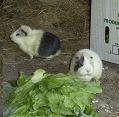|
 Home Home
 What's New? What's New?
 Definition Definition
 Our Design Our Design
 Techniques Techniques
 Articles Articles
 Blog Blog
 About Us About Us
 Year Planner Year Planner
 Resources Resources
 Links Links

Like us on
FaceBook!

Link to this site
|
|
Permaculture Techniques - Companion Planting
Description
Uses knowledge about specific plants and their characteristics in a deliberate manner to aid the growth of other plants, by placing plants with mutually beneficial associations near each other.
Benefits
- Plants can assist each other to grow.
- Plants can repel insects or other pests (animals - grazing, etc).
- Plants can repel other plants (eg. used as borders against invasive plants).
- Some specific plants can accumulate trace minerals from soil, which when composted can release these minerals for use.
- Plants can attract pollinating agents (bees, insects, some birds).
Procedure
- Plan companion planting. The Organic Gardener's Companion (Anne Hazelwood, 1982) recommends organising companion planting and crop rotations on paper first to avoid unhappy combinations and results.
- Determine needs and characteristics of individual plants either by direct observation or by research. Understand action of symbiotic relationship in companion planting between plants - nitrogen fixing, odour, root secretions, supply of nutrients to soil, shelter, shading, discouraging pests through appearance or excretions, physical shape, insect attractant or repellent, sacrificial element.
- Understand it may take a while for benefit to show (eg. marigolds need to be grown over at least one full season to be effective in nematode control).
- Keep records of companion planting and its effects over time.
|
|

Our ever-changing view!
Moonset ~ Roll Cloud ~ Sunset
|
permaculture ethics |
care for earth,
care for people,
return surplus,
reduce consumption |
 |
|
Recently Added Pages
Hot Links!

Bookworm is currently reading...
This site is sponsored by
ALWAYS LEARNING BOOKS
Publishers of Australian
books on Home Education.
  The Educating Parent The Educating Parent
  Beverley's other websites Beverley's other websites
|





